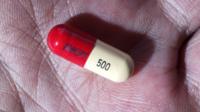
People who need treating with repeated courses of antibiotics may be at increased risk of developing type 2 diabetes, researchers have found.
The European Journal of Endocrinology study traced antibiotic prescriptions given out to a million UK patients.
The authors say the findings do not necessarily mean that the drugs trigger diabetes - instead, infections may be a warning sign that diabetes is imminent.
They say more work is now needed to understand the link.
This is a very large and helpful study linking diabetes with antibiotic consumption in the UK public, but at this stage we don't know which is the chicken and which is the egg
The study looked at how many antibiotic prescriptions had been given to 208,000 diabetic patients - both type 1 and type 2 diabetics - at least one year before they were diagnosed with their condition, compared with 816,000 non-diabetic patients of the same age and sex.
Nearly half of the patients had been prescribed antibiotics at some point over the course of the study period.
And the researchers found the risk of type 2 diabetes went up with the number of antibiotic prescriptions a patient received.
For example:
- The risk of type 2 diabetes was 8% higher among patients prescribed two to five courses of penicillin-type antibiotics, and 23% higher among those given more than five courses of these drugs
- For another class of antibiotics known as quinolones, type 2 diabetes risk was 15% higher among patients prescribed two to five courses and 37% higher among those given more than five courses
No link was found with antifungal drugs and antiviral drugs. And antibiotic use did not appear to affect risk of type 1 diabetes.
Red flag or trigger?

The researchers, Dr Ben Boursi and colleagues from the University of Pennsylvania in the US, believe changes to gut bacteria triggered by taking antibiotics might explain their findings.
Our guts are lined with billions of bacteria and antibiotics can wipe some of these out.
Studies in animals and humans have hinted that changes to this "digestive ecosystem" might contribute to conditions such as diabetes and obesity.
Dr Boursi said: "Over-prescription of antibiotics is already a problem around the world as bacteria become increasingly resistant to their effects.
"Our findings are important, not only for understanding how diabetes may develop, but as a warning to reduce unnecessary antibiotic treatments that might do more harm than good."
But some say repeated infections could be a sign that diabetes is developing. People with type 2 diabetes are prone to skin and urine infections, for example.
Prof Jodi Lindsay from St George's, University of London, said that since people with type 2 diabetes were at increased risk of developing infections, it was hard to tease the two apart.
"This is a very large and helpful study linking diabetes with antibiotic consumption in the UK public, but at this stage we don't know which is the chicken and which is the egg.
"The idea that antibiotics might contribute to diabetes development might be important and more research needs to be done."

Diabetes

There are two main types: type 1 and type 2
- In type 1, which accounts for about 10% of diabetes, the body's immune system destroys the cells that make insulin
- Type 2 diabetes is when the body either cannot make enough insulin or the body's cells do not react to it
- Insulin treatment is always needed for type 1 diabetes, while if you have type 2 you may be able to control your symptoms by eating a healthy diet, exercising regularly and monitoring your blood sugar.

Anda sedang membaca artikel tentang
Antibiotic use linked to diabetes
Dengan url
http://beritaasalusil.blogspot.com/2015/03/antibiotic-use-linked-to-diabetes.html
Anda boleh menyebar luaskannya atau mengcopy paste-nya
Antibiotic use linked to diabetes
namun jangan lupa untuk meletakkan link
Antibiotic use linked to diabetes
sebagai sumbernya
0 komentar:
Posting Komentar